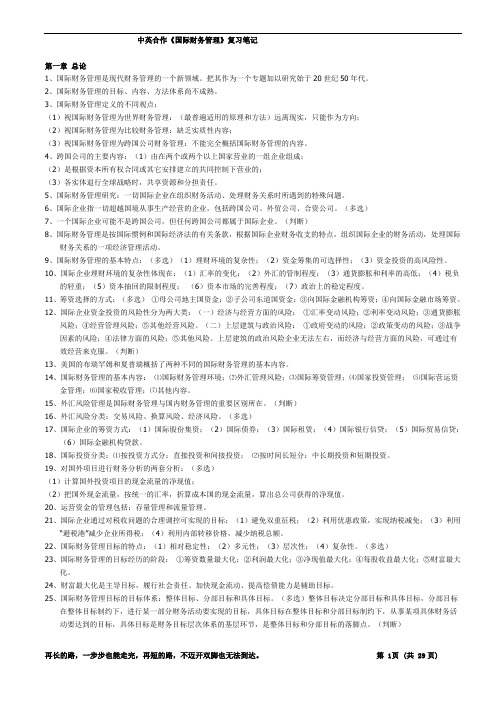国际财务管理Ch01总论
- 格式:ppt
- 大小:1.72 MB
- 文档页数:71




中英合作《国际财务管理》复习笔记第一章总论1、国际财务管理是现代财务管理的一个新领域。
把其作为一个专题加以研究始于20世纪50年代。
2、国际财务管理的目标、内容、方法体系尚不成熟。
3、国际财务管理定义的不同观点:(1)视国际财务管理为世界财务管理:(最普遍适用的原理和方法)远离现实,只能作为方向;(2)视国际财务管理为比较财务管理:缺乏实质性内容;(3)视国际财务管理为跨国公司财务管理:不能完全概括国际财务管理的内容。
4、跨国公司的主要内容:(1)由在两个或两个以上国家营业的一组企业组成;(2)是根据资本所有权合同或其它安排建立的共同控制下营业的;(3)各实体退行全球战略时,共享资源和分担责任。
5、国际财务管理研究:一切国际企业在组织财务活动、处理财务关系时所遇到的特殊问题。
6、国际企业指一切超越国境从事生产经营的企业,包括跨国公司、外贸公司、合资公司。
(多选)7、一个国际企业可能不是跨国公司,但任何跨国公司都属于国际企业。
(判断)8、国际财务管理是按国际惯例和国际经济法的有关条款,根据国际企业财务收支的特点,组织国际企业的财务活动,处理国际财务关系的一项经济管理活动。
9、国际财务管理的基本特点:(多选)(1)理财环境的复杂性;(2)资金筹集的可选择性;(3)资金投资的高风险性。
10、国际企业理财环境的复杂性体现在:(1)汇率的变化;(2)外汇的管制程度;(3)通货膨胀和利率的高低;(4)税负的轻重;(5)资本抽回的限制程度;(6)资本市场的完善程度;(7)政治上的稳定程度。
11、筹资选择的方式:(多选)①母公司地主国资金;②子公司东道国资金;③向国际金融机构筹资;④向国际金融市场筹资。
12、国际企业资金投资的风险性分为两大类:(一)经济与经营方面的风险:①汇率变动风险;②利率变动风险;③通货膨胀风险;④经营管理风险;⑤其他经营风险。
(二)上层建筑与政治风险:①政府变动的风险;②政策变动的风险;③战争因素的风险;④法律方面的风险;⑤其他风险。


Chapter 1Globalization and the Multinational FirmWhat’s Special about International Finance?Foreign Exchange and Political RisksMarket ImperfectionsExpanded Opportunity SetGoals for International Financial ManagementGlobalization of the World Economy: Major Trends and DevelopmentsEmergence of Globalized Financial MarketsEmergence of the Euro as a Global CurrencyEurope’s Sovereign Debt Crisis of 2010Trade Liberalization and Economic IntegrationPrivatizationGlobal Financial Crisis of 2008–2009Multinational CorporationsA PPENDIX 1A: Gain from Trade: The Theory of Comparative AdvantageSummaryThis chapter provided an introduction to International Financial Management.1. It is essential to study “international” financial management because we are now living in a highly globalized and integrated world economy. Owing to the (a) continuous liberalization of international trade and investment, and (b) rapid advances in telecommunications and transportation technologies, the world economy will become even more integrated.2. Three major dimensions distinguish international finance from domestic finance. They are (a) foreign exchange and political risks, (b) market imperfections, and (c) an expanded opportunity set.3. Financial managers of MNCs should learn how to manage foreign exchange and political risks using proper tools and instruments, deal with (and take advantage of) market imperfections, and benefit from the expanded investment and financing opportunities. By doing so, financial managers can contribute to share-holder wealth maximization, which is the ultimate goal of international financial management.4. The theory of comparative advantage states that economic well-being is enhanced if countries produce those goods for which they have comparative advantages and then trade those goods. The theory of comparative advantage provides a powerful rationale for free trade. Currently, international trade is becoming liberalized at both the global and the regional levels. At the global level, WTO plays a key role in promoting free trade. At the regional level, the European Union and NAFTA play a vital role in dismantling trade barriers within regions.5. The subprime mortgage crisis in the United States that began in the summer of 2007 led to a severe credit crunch. The credit crunch, in turn, escalated to a major global financial crisis in 2008–2009. The global financial crisis may be attributable to several factors, including (i) excessive borrowing and risk taking by both households and banks, (ii) failure of government regulators to detect the rising risk in thefinancial system and take timely preventive actions, and (iii) the inter-connected and integrated nature of financial markets. In addition, the world economy was buffeted by Europe’s sovereign-debt crisis. The crisis started in Greece in December 2009 when it was disclosed that the country’s budget deficit would be far worse than previously forecasted. The panic spread among weak European economies. The interest rates in these countries rose sharply and, at the same time, the euro depreciated sharply in currency markets, hurting its credibility as a major global currency.6. A major economic trend of the recent decades is the rapid pace with which former state-owned businesses are being privatized. With the fall of communism, many Eastern Bloc countries began stripping themselves of inefficient business operations formerly run by the state. Privatization has placed a new demand on international capital markets to finance the purchase of the former state enterprises, and it has also brought about a demand for new managers with international business skills.7. In modern times, it is not a country per se but rather a controller of capital and know-how that gives the country in which it is domiciled a comparative advantage over another country. These controllers of capital and technology are multinational corporations (MNCs). Today, it is not uncommon for an MNC to produce merchandise in one country, on capital equipment financed by funds raised in a number of different currencies, through issuing securities to investors in many countries and then selling the finished product to customers all over the world.。
ch1 财务管理总论1. 引言财务管理是企业管理的重要组成部分,是指利用财务手段对企业进行规划、组织、指导和控制,以实现企业经营目标的管理活动。
财务管理的目标是通过合理的资金配置和风险控制,提高企业的价值和竞争力。
本文将介绍财务管理的定义、目标和基本原则,以及财务管理的重要性和作用。
2. 财务管理的定义财务管理是指企业利用财务手段对企业进行规划、组织、指导和控制,以实现企业经营目标的管理活动。
财务管理包括财务计划、资金筹措、投资决策、资金使用、风险管理等方面的内容。
财务管理的核心是合理配置资金,实现资金的最优利用。
3. 财务管理的目标财务管理的主要目标是通过合理的资金配置和风险控制,提高企业的价值和竞争力。
具体来说,财务管理的目标包括以下几个方面:•盈利目标:通过高效的资金配置和风险管理,实现企业的盈利最大化。
•偿债能力目标:确保企业有足够的资金偿付债务,保障企业的偿债能力。
•成长目标:通过合理的投资决策,推动企业的持续成长和发展。
•流动性目标:维护企业的流动性,保证企业在经营中能够及时支付应付款项。
4. 财务管理的基本原则财务管理的实践应遵循一些基本原则,以保证财务管理的科学性和合理性。
以下是财务管理的基本原则:•收入与支出原则:收入与支出要实事求是地计算核算,确保财务信息的真实性和准确性。
•现金流量原则:财务管理应重视现金流量的管理,即合理配置现金流入和流出,确保企业的偿债和运营的稳定性。
•风险与收益原则:财务管理应根据企业的风险承受能力和收益预期,制定合理的投资决策和风险管理策略。
•时间价值原则:财务管理应考虑资金的时间价值,即在投资和融资决策中应考虑资金的时间价值因素。
5. 财务管理的重要性和作用财务管理在企业管理中起着重要的作用,具体体现在以下几个方面:•资金配置:财务管理通过合理配置资金,提高资金的使用效益,从而实现企业经营目标。
•投资决策:财务管理对企业的投资决策起着重要作用,通过对不同项目的风险和收益进行评估,帮助企业做出合理的投资决策。